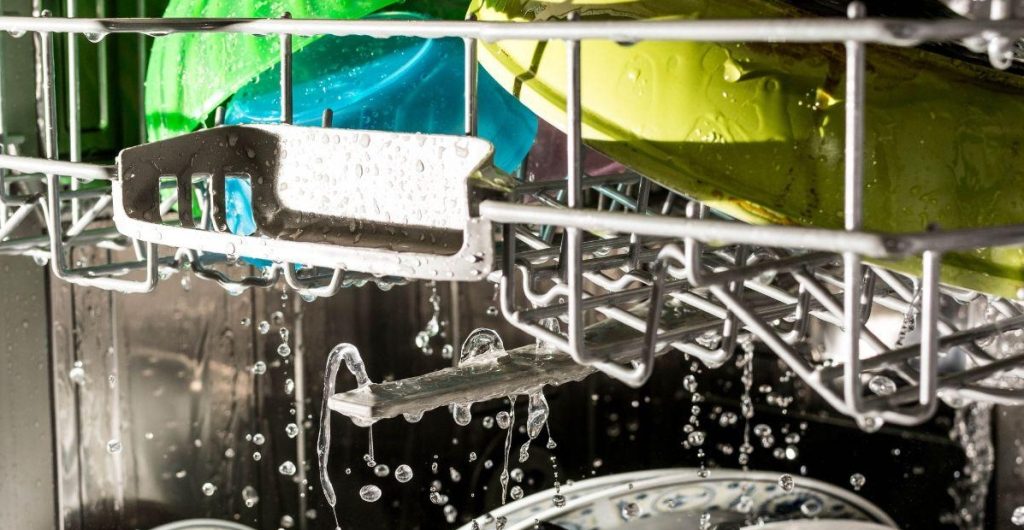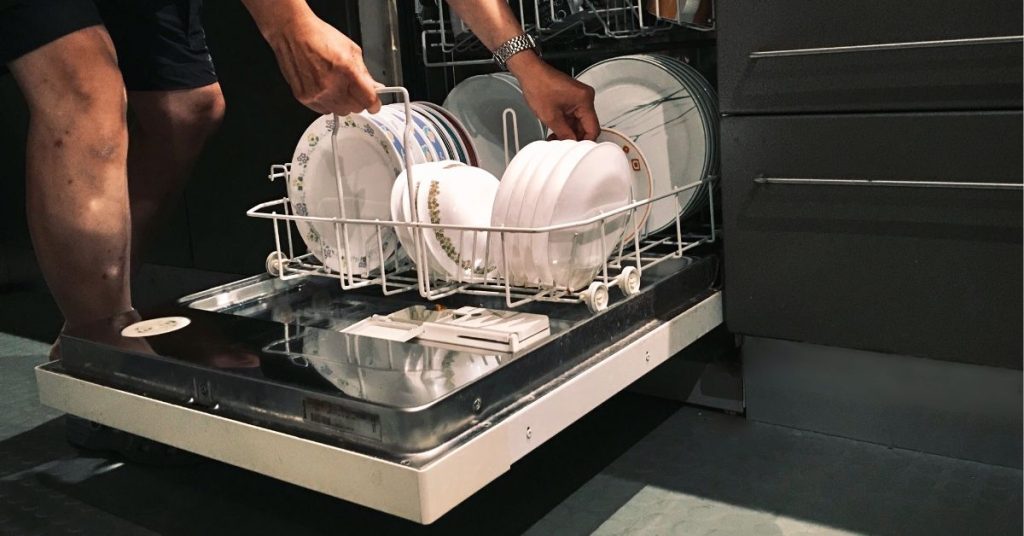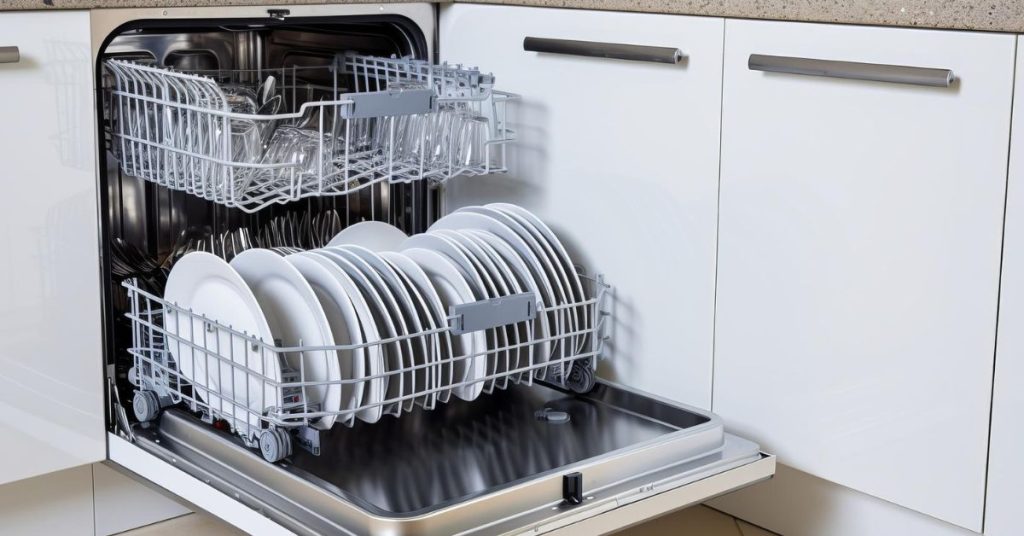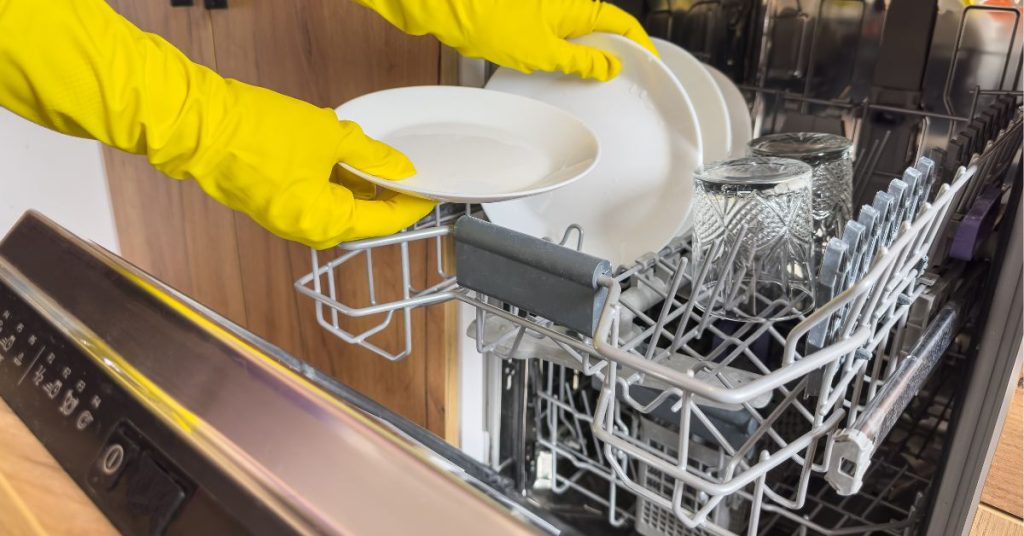The dishwasher has become an integral part of many households. It offers convenience and efficiency for busy people. But how much water does a dishwasher use? This is a common question for those looking to reduce water consumption and make eco-friendly choices.
Dishwashers can consume varying amounts of water depending on factors such as the model, age, and setting. Exploring these factors will help us minimize water usage while still maintaining the benefits of a dishwasher.
How Much Water Does a Dishwasher Use?
Several factors affect how much water a dishwasher uses, including the model, age, and cycle. On average, a standard dishwasher uses between 3 to 10 gallons of water per cycle. Energy-efficient models can use as little as 3 to 5 gallons per cycle, making them a more sustainable choice than older models that could use up to 14 gallons.
The cycle setting you choose also plays a significant role in water consumption. For instance, an “Eco” or “Energy-Saver” cycle typically uses less water, around 3 to 4 gallons, while a “Heavy” or “Pots and Pans” cycle may use closer to 10 gallons. Although these figures are a general guide, the actual water usage will depend on the dishwasher model and how efficiently it works.
Factors Affecting Dishwasher Water Consumption
Several key factors influence how much water a dishwasher uses. Taking into account these factors can help you reduce your water consumption and make better appliance decisions.
Dishwasher Model and Age
The model and age of your dishwasher are significant determinants of water usage. Dishwashers made before 2000 are generally less efficient, using up to 10-14 gallons of water each cycle. However, modern ENERGY STAR-rated dishwashers use 3-5 gallons per cycle, which is more water-efficient. You can save a lot of water over time if you upgrade to a newer model.
Cycle Type and Settings
The type of cycle you select can dramatically affect the amount of water your dishwasher consumes. For example:
- Normal Cycle: Uses a moderate amount of water, typically between 4-7 gallons.
- Eco-Cycle: Designed for efficiency, it uses less water, usually around 3-4 gallons.
- Heavy Duty or Pots and Pans Cycle: Uses the most water, often 8-10 gallons, to tackle tough, baked-on food.
Choosing the proper cycle based on the level of soiling can help you optimize water use.
Load Size
Running a dishwasher with a full load is generally the most water-efficient option. Half-empty dishwashers use almost as much water as fully-loaded ones, so waiting until you have enough dirty dishes can save you a lot of water. Overloading the dishwasher can result in poor cleaning results, which wastes water and energy.
Water Efficiency Ratings
When purchasing a dishwasher, checking its water efficiency rating is essential. The ENERGY STAR program certifies dishwashers that meet specific energy and water usage standards. You can use these ratings to determine how much water the appliance will use and choose the most efficient model.
Consider these factors to better manage your dishwasher’s water consumption. This will help the environment and could save you money.
Tips for Reducing Dishwasher Water Usage
Though dishwashers are generally more water-efficient than hand washing, there are still ways to cut back. With a few simple practices, you can save even more water and make your kitchen more eco-friendly.
Use Efficient Settings
The most modern dishwashers have eco-friendly and energy-saving cycles. They’re designed to save water and energy without sacrificing cleaning power. Choose these cycles whenever possible, especially for lightly soiled dishes. They usually use lower temperatures and shorter wash times, so they use less water.
Run Full Loads
The best way to reduce water usage is to run the dishwasher only when it’s fully loaded. A half-full dishwasher uses almost as much water as a full one, so wait until there are enough dirty dishes to fill it. However, don’t overload the dishwasher since that can result in poor cleaning results.
Skip the Pre-Rinse
In general, pre-rinsing dishes before putting them in the dishwasher is unnecessary and wastes water. Nowadays, dishwashers don’t need to pre-rinse because they handle food particles and residue. Simply scrape off big food scraps and throw them in the trash or compost. This not only saves water but also time and effort.
Regular Maintenance
Keeping your dishwasher well-maintained is crucial for its efficiency. To keep your dishwasher running smoothly, it’s important to clean the filter regularly, check the spray arms for blockages, and keep the door seals intact. Over time, a well-maintained dishwasher uses less water and energy.
Invest in a High-Efficiency Dishwasher
Consider upgrading your dishwasher to a high-efficiency, ENERGY STAR-rated model if yours is an older model. These models are specifically designed to save water and energy. They often use half the water older appliances do. Despite the upfront cost, you’ll save money on water and energy bills, plus you’ll be protecting the environment.
FAQs
How much hot water does a dishwasher use?
Dishwashers use different amounts of hot water depending on the model and cycle type. On average, most dishwashers use about 3 to 5 gallons of hot water per cycle. However, some older or less efficient models can consume up to 10-14 gallons.
The best dishwashers use hot water efficiently, heating it to temperatures around 120°F to 150°F while minimizing overall consumption.
How much water does a dishwasher use per cycle?
Modern, energy-efficient dishwashers typically use between 3 and 5 gallons of water per cycle. Compared to newer dishwashers, older dishwashers can consume up to 14 gallons per cycle. The exact water usage depends on the model, age, and selected cycle type. Choosing eco-friendly or energy-saving cycles can help you save water while still getting a good clean.
How much water does a bosch dishwasher use?
Bosch dishwashers are known for their efficiency. Depending on the model and wash program, they use about 2.9 to 3.5 gallons of water per cycle. Bosch models are ENERGY STAR certified, which means they use less water and energy while cleaning better. When possible, use the eco or energy-saving cycles to save water.
How much water does a whirlpool dishwasher use?
Depending on the model and wash cycle, Whirlpool dishwashers use 3 to 4 gallons of water per cycle. Many Whirlpool models are ENERGY STAR certified, which means they use less water and still clean well. To save water, use the eco or energy-saving settings whenever you can.
How much water does a frigidaire dishwasher use?
Frigidaire dishwashers, depending on the model, typically use 5 gallons of water per cycle. Most models are designed for efficiency and often come with ENERGY STAR certification, so they use less water while still cleaning well. To save water, you should use the eco or energy-saving cycles whenever possible.
How much water does a ge dishwasher use?
In general, GE dishwashers use between 6.4 and 8.6 gallons of water per cycle, depending on the model and wash cycle selected. GE dishwashers are ENERGY STAR certified, so they’re energy—and water-efficient. Utilizing eco-friendly or energy-saving cycles can further reduce water consumption while still getting the job done. Make sure you check your model’s specs for details on water usage.
How much water does a Samsung dishwasher use?
Samsung dishwashers use 12 gallons of water per cycle, depending on their model and wash program. Most Samsung models are designed for efficiency and often come with ENERGY STAR certification, so they use less water and energy. To save water, you should use the eco or energy-saving cycles on your model. For specific water usage details, check the user manual.
Conclusion
It’s essential to know how much water a dishwasher uses so you can make informed decisions. The average dishwasher uses 3 to 5 gallons per cycle, way less than hand washing. Follow best practices, select energy-efficient models, and use appropriate cycles to reduce water consumption. Choosing a dishwasher thoughtfully will not only benefit your wallet but also support a sustainable lifestyle.







